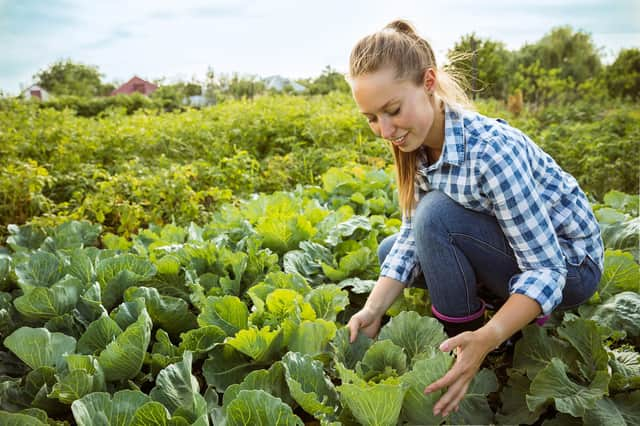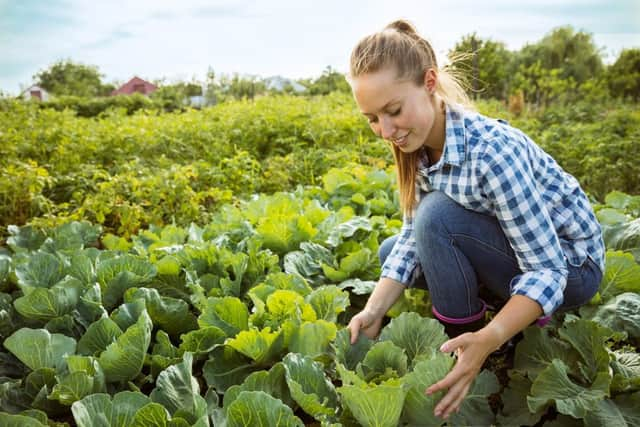Going Green - Making our gardens more eco-friendly to protect environment


Latest article from Angela Terry
Green Green campaigner and consumer expert, Angela Terry, separates climate change facts from fiction and here she explains how you can take simple, practical steps to help save the planet. Follow @ouronehome & visit https://onehome.org.uk/ for more advice.
Q: How do I make my garden more eco-friendly?
A: A timely question.


It’s the Royal Horticultural Society’s National Gardening Week from the May 2 to 8, so now’s the time to get out your trowel. Here are my tips for greening your green space:
Ditch plastic grass
I’m afraid fake grass is a no-no.
Advertisement
Hide AdAdvertisement
Hide AdIt depletes soil health and deprives vital pollinators, earth worms and insects of a home.
Its carbon footprint is also sky high, as plastic is made from fossil fuels.
Moreover, a fake lawn doesn’t capture and store carbon emissions like grass lawns or real plants in real soil do.
Also try to avoid paving over your garden.
Green gardens reduce flooding, store carbon, provide homes for bees and other essential creatures, keep cities cool in the summer and help us all feel happier.
Say no to the mow
Put your feet up and let nature take over.
Leave a section of your lawn to grow wild.
Advertisement
Hide AdAdvertisement
Hide AdThe RSPB has an online guide, as birds are dependent on insects for food – and bugs are in short supply in short lawns.
The Eden Project’s website has a section on how to plant a wild meadow at home.
You can buy wildflower ‘plug plants’ online, but make sure they’re from the UK – to ensure they’re right for our climate and free from unexpected pests.
Chemical-free
Try to avoid artificial fertilisers and pesticides.
Natural ecosystems are all about balance.
Introducing toxins harms much more than the weeds or pests you’re targeting.
Advertisement
Hide AdAdvertisement
Hide AdFor fertilisers, you can make your own compost. The charity Garden Organic has an online guide.
Alternatively, buy organic fertilisers. When it comes to naturally removing pests and controlling plant diseases, the Royal Horticultural Society offers advice on its website.
Veg patch
You can save yourself cash if you grow some vegetables.
It’s a great project to do with kids. Start with a single container.
Seeds that can be sown in May include courgettes, carrots and sprouting broccoli.Wildlife
Advertisement
Hide AdAdvertisement
Hide AdInsects are vital to the health of your garden. Bees especially need our help. Create homes for them with bug and bee hotels. The Natural History Museum offers online guides. You can also make a wormery, as more worms mean better soil. Find out how on The Wildlife Trust’s website.
Lighting
Try and use solar-powered lights. It’s a good idea to put them on a timer to switch off at night, to avoid negatively impacting nocturnal animals and migratory birds.
Water
Put out some water for birds and insects to drink, especially in the summer.
Celebrity spot
Dragons’ Den star Deborah Meaden presents The Big Green Money Show on BBC Radio 5 Live.


Advertisement
Hide AdAdvertisement
Hide AdAlso available on BBC Sounds, it’s an opportunity for her to grill some of biggest names in the business world – including CEOs of banks, energy companies, airlines and car manufacturers – about their plans for dealing with the climate crisis and transitioning to net-zero.
With a long-term interest in eco-friendly and ethical business, Meaden has a keen eye for greenwash and a no-nonsense interview style. Worth a listen!
Green swap
When visiting friends or family, try taking the train or bus instead of your car.


Public transport is much greener than using personal vehicles. Plus you won’t have the stress of driving. Buy ahead to get the best value ticket.
How best to talk to kids about climate change


Growing up in a time of climate crisis isn’t easy.
Advertisement
Hide AdAdvertisement
Hide AdImages of deforestation, melting glaciers and wildfires seem everywhere.
The scale and severity of the situation is difficult for adults to comprehend. Children can find it overwhelming.
The temptation is to tell them not to worry, but this will add to their genuine concern that this issue is being ignored by the ‘grown-ups’. Focus instead on positive solutions.
Here are some tips ...
Listen
Listen to their worries and acknowledge them. Don’t dismiss them out-of-hand. Empathise and show you’re concerned too.
Empower
Advertisement
Hide AdAdvertisement
Hide AdEmpower without making them feel overly responsible. Tell them we all have a role to play in addressing this issue – but it’s not all on them.
Point out they’re not alone. Talk about all the people who are also worried and striving to effect change. Look at the work of green charities and activists.
Remind them that everyday actions add up
Taking everyday actions – like eating less meat or snuggling under a blanket instead of turning up the thermostat – can empower kids.
Remind them that it’s impossible to live a completely pollution-free life. We need lots of people going green imperfectly, rather than a few doing it perfectly.
Help manage digital activities
Advertisement
Hide AdAdvertisement
Hide AdSocial media has a huge effect on children’s moods. Scary statistics and gloomy predictions are worrying for anyone.
It’s important to stay informed, so follow accounts that offer a solutions-based outlook like @zero.waste.collective, @thegreenhub, @ouronehome and @lowimpactmovement sites.
Make sure children are looking at websites that talk about climate change in an age-appropriate way.
Designed specifically for children, NASA’s Climate Kids website has a wide range of resources, including videos and games.
Highlight the positive
Advertisement
Hide AdAdvertisement
Hide AdIt’s not all doom and gloom. Share positive climate stories as a reminder that change is possible.
Make green familyspending decisions
Discuss with your children which products your family buys. There are sustainable alternatives for everything, from food and fashion to cars and bank accounts. If the green alternative is more expensive, ask your children if they would be happy to go without something to pay for it.
Help them join or starta group with friends
Joining climate-focused community and action groups can really help with feelings of anxiety. Working towards tangible solutions with others gives kids a greater sense of comfort and control.
Fact or fiction
Eco products more expensive. False! Eco option often costs less.
Advertisement
Hide AdAdvertisement
Hide AdExample, running electric car costs less than running a petrol one. White vinegar and bicarbonate of soda cheaper than ready-made kitchen and bathroom cleaners
For previous articles visit:
Advertisement
Hide AdAdvertisement
Hide Ad